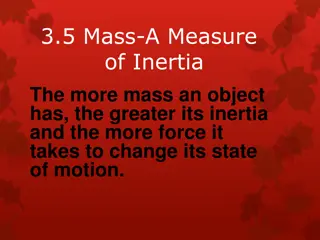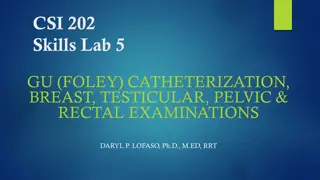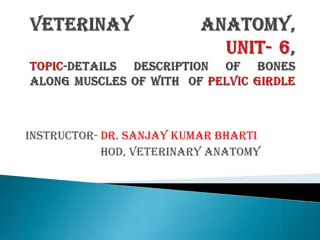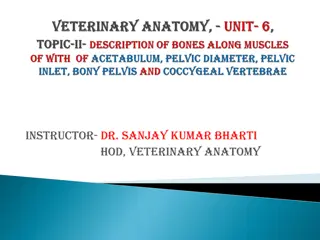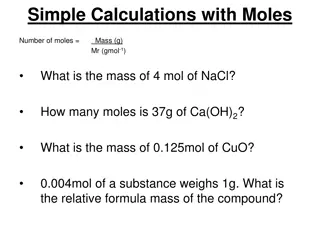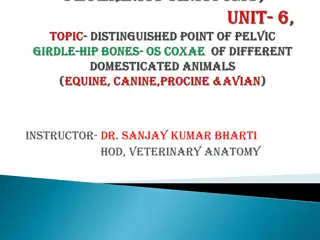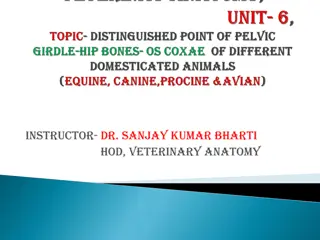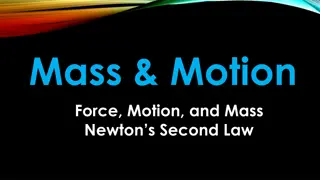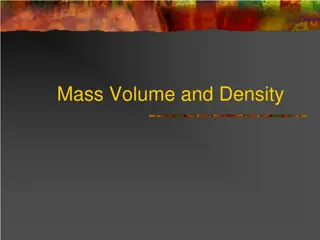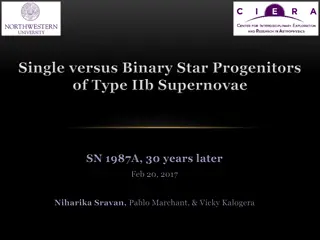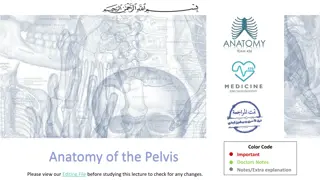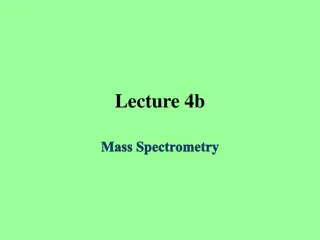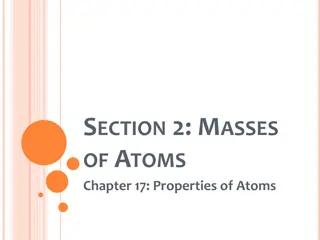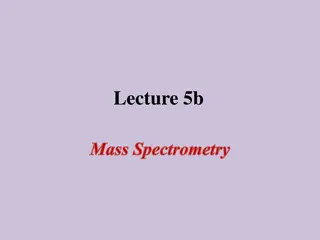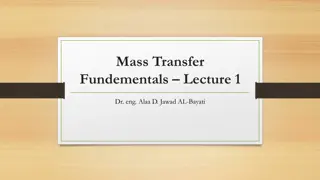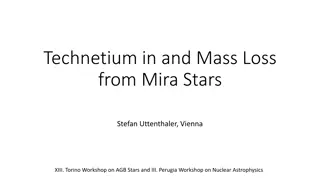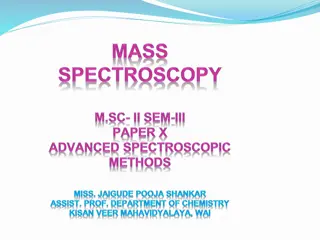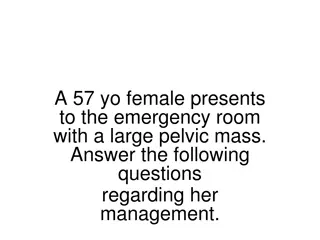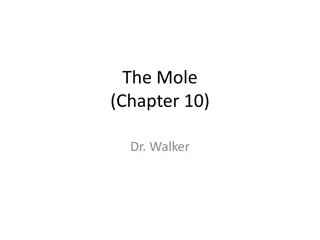Understanding Mass Media and Communication for the Academic Year 2020/2021
This content delves into the science of media, communication, and mass communication for the academic year 2020/2021. It explores the role of mass media in public communication, the characteristics of mass media, and the various types of mass media such as books, print media, films, radio, televisio
8 views • 11 slides
Unveiling the Best Mass Gainers in India for Maximum Muscle Growth
Discover the ultimate solution for achieving your muscle-building goals with the best mass gainers available in India. Our comprehensive guide delves into the top-rated products designed to support your mass gain journey effectively. Whether you're a beginner or a seasoned fitness enthusiast, these
6 views • 1 slides
Understanding Mass and Inertia in Physics
Mass and inertia are fundamental concepts in physics. Mass is the amount of material in an object, determining its inertia - the resistance to change in motion. Objects with greater mass require more force to change their state of motion. Mass should not be confused with volume or weight, as they ar
0 views • 21 slides
Gas-Liquid Equipment in Mass Transfer Operations
Gas-liquid operations play a crucial role in mass transfer processes by facilitating intimate contact between the two fluids for efficient interphase diffusion. Various equipment such as sparged vessels (bubble columns) and mechanically agitated vessels are used to disperse gas or liquid phases, pro
2 views • 27 slides
Understanding Measurement Tools for Mass, Volume, and Density
Explore how to measure length using metric rulers, find mass with balances, distinguish between mass and weight, calculate volume through displacement or dimensions, calculate density, and understand relative density in liquids. Learn about regular and irregular volumes, mass units, weight units, an
1 views • 40 slides
Clinical Skills Lab: Foley Catheterization, Breast & Pelvic Examinations
This informative content covers topics such as urethral catheterization, indications for catheterization, anatomic landmarks, male and female catheterization techniques, nosocomial UTIs, pelvic and breast examinations, breast cancer screening recommendations, and breast cancer statistics. It is a co
1 views • 17 slides
Understanding Pelvic Limb Anatomy: Bones and Muscles Overview
Bones and muscles of the pelvic limb, including the pelvis, thigh, leg, and foot, are detailed in this informative content. It covers the general designations of pelvic bones, descriptions of bones along with muscle attachments in various animals, and specifics about the hip bone structure and forma
1 views • 15 slides
Veterinary Anatomy Overview: Pelvic Cavity and Bony Pelvis Structures
The instructor, Dr. Sanjay Kumar Bharti, explains the acetabulum, obturator foramen, sexual differences, and characteristics of sheep and goats related to pelvic anatomy. Details include the structure of the acetabulum, the large obturator foramen, pelvic cavity, and differences between male and fem
2 views • 18 slides
Understanding Mole Calculations in Chemistry
Explore various mole calculations in chemistry such as determining mass from moles, moles from mass, and comparing particles in different substances. Learn how to calculate the mass of substances, the number of particles, and perform calculations using balanced equations. Dive into concepts like mol
0 views • 49 slides
Veterinary Anatomy: Pelvic Structures and Sexual Dimorphism in Animals
The article discusses the anatomy of the acetabulum, obturator foramen, pelvic cavity, pelvic inlet and outlet, and sexual differences in the pelvis, with a focus on sheep and goats. It covers the structure of these pelvic components and highlights the variations between male and female anatomies. D
0 views • 19 slides
Understanding Pelvic Anatomy in Veterinary Science
In this educational content, we delve into the intricate details of acetabulum, obturator foramen, pelvic cavity, pelvic inlet and outlet, sexual differences, and anatomical variations in sheep and goats. The explanations are accompanied by informative images to aid in better comprehension.
0 views • 19 slides
Understanding Mass, Volume, and Density in Science
Discover the essential concepts of mass, volume, and density in science. Learn how to differentiate between these terms, their units of measurement, and their significance in understanding the physical properties of objects. Explore the importance of mass in determining the amount of matter, the con
0 views • 16 slides
Understanding Mass, Motion, and Force According to Newton's Second Law
Explore the relationship between mass, motion, and force through Newton's Second Law. Learn how the mass of an object affects the force required to change its motion, illustrated with examples like hitting different balls with the same force and pulling a wagon empty vs. loaded. Dive deeper into the
0 views • 10 slides
Role of Lymphadenectomy in Genital Malignancies
Pelvic and paraaortic lymph node evaluation is crucial in the surgical staging of gynecological malignancies. The goals of lymph node dissection are to determine disease extent and guide further treatment. Pelvic lymph nodes include common iliac, external and internal iliac, obturator, sacral, and p
0 views • 16 slides
Understanding Effective Mass in Crystals: Insights and Applications
The concept of effective mass in crystals delves into how electrons interact with the lattice potential, leading to altered particle masses that affect their behavior. This phenomenon is crucial in applying electrodynamics equations to charge carriers in solids, where the electron mass can differ fr
0 views • 18 slides
Insights on Pelvic Injuries, Open Fractures, and Young Classification in Trauma Care
Explore the expertise of Dr. Abdulaziz Alrabiah, MD in Emergency Medicine, Trauma & EMS through detailed images and descriptions of pelvic injuries, open fractures, and the Young Classification system. Enhance your knowledge on these critical aspects of trauma management.
0 views • 5 slides
Understanding Mass Spectroscopy and Magnetic Sector Design in MS
Introduction to Mass Spectroscopy (MS), key physics effects, magnetic sector MS design considerations, measuring mass/charge ratio, and using derived principles to scan a magnetic sector MS. Learn about the historical development of magnetic sector mass spectrometers and the first recorded MS spectr
0 views • 14 slides
Introduction to Atomic Masses and Mass Spectrometry
Understanding atomic masses, isotopes, and mass spectrometry in the context of chemistry, particularly the concept of standard atomic mass unit (amu) and its application in measuring the masses of atoms. The content delves into the composition of atoms, isotopes, and how to determine the mass of an
1 views • 20 slides
Understanding Mass, Volume, and Density in Physics
Matter, which makes up the universe, has mass and volume. Learn the differences between mass and volume, and weight, as well as how to measure them accurately. Discover why a ton of bricks and a ton of feathers have the same mass but different volume. Understanding the concepts of mass, volume, and
3 views • 12 slides
Understanding Pelvic Ultrasonography: A Comprehensive Guide
Explore the detailed anatomy and variations of the uterus, ovaries, fallopian tubes, and adnexa in pelvic ultrasonography. Learn about the different shapes and sizes of the uterus, layers of the uterine wall, and indications for pelvic ultrasound examination. Discover the significance of the appeara
1 views • 18 slides
Understanding Weight and Mass in Physics
Weight and mass are two fundamental concepts in physics that are often misunderstood. Weight is the gravitational force acting on an object, while mass is the measure of its inertia. This article clarifies the relationship between weight and mass, explains the force of gravity, and discusses how the
2 views • 9 slides
Exploring Weight and Mass in Year 1 Science Curriculum
Dive into the concept of weight and mass in the Year 1 Spring Block 4 curriculum. Students compare, describe, and solve practical problems related to weight and mass using vocabulary like balance scales, heavier, lighter, and more. The content encourages engaging activities to measure and record mas
0 views • 43 slides
Physiotherapy Support for Mothers with OASI - Expert Guidance and Rehabilitation
Providing specialized physiotherapy support for mothers experiencing Obstetric Anal Sphincter Injuries (OASI) is crucial for addressing immediate problems like pain, urinary or fecal incontinence, and more. With a focus on pelvic health, this approach involves reassurance, tailored pelvic floor musc
0 views • 12 slides
Mass Gathering Hajj Pharmacy Indicators: New Initiative in Saudi Arabia
This initiative in Saudi Arabia focuses on driving national mass gathering pharmaceutical programs at Hajj. The project includes guidelines, a business model, project management, and monitoring phases to improve pharmacy services during mass gatherings. The project aims to enhance clinical and econo
1 views • 4 slides
Unveiling the Progenitors of Stripped Envelope Supernovae (SNe)
The mechanism behind the stripping of stripped-envelope SNe remains a key question linked to their progenitors. Various mechanisms such as Single Star Progenitors, Binary Star Progenitors, Stellar Winds, and Close Binary Interactions are thought to dominate the stripping process. Observations of Typ
0 views • 12 slides
Understanding Pelvic Anatomy: Bones, Joints, and Muscles
Explore the comprehensive overview of the anatomy of the pelvis, including its walls, bones, joints, muscles, and differentiations between male and female pelves. Learn about the boundaries, subdivisions, and pelvic floor components, as well as the arterial, nerve, lymph, and venous supplies. Delve
0 views • 27 slides
A Brief Overview of Mass Spectrometry and Its Historical Significance
Mass spectrometry is a powerful analytical technique used to determine the masses of particles. This summary provides insights into the history of mass spectrometry, key contributions by notable scientists, electron impact mass spectrometry, connection with gas chromatography, fragmentation patterns
0 views • 10 slides
Understanding Atomic Mass and Isotopes in Atoms
Explore the concept of atomic mass in atoms, learn to compute atomic mass and mass number, identify isotopes, and calculate the number of neutrons in an atom. Understand the significance of the atomic number and mass number in determining the characteristics of elements.
0 views • 14 slides
Understanding Mass Spectrometry: From History to Techniques
Explore the fascinating history of mass spectrometry, from the discovery of isotopes by J.J. Thomson and F.W. Aston to modern developments like the quadrupole mass spectrometer. Learn about Electron Impact Mass Spectrometry, its techniques, and the information derived from mass spectra, including mo
0 views • 15 slides
Understanding Female Pelvis Anatomy and Differences from Male Pelvis
The female pelvis anatomy lecture covers the pelvic wall, bones, joints, and muscles. It explains the boundaries, subdivisions, and types of female pelvis, along with details on pelvic walls, floor, and diaphragm components. Additionally, it includes information on arterial, nerve, lymph, and venous
0 views • 13 slides
Understanding Center of Mass in Physics
Exploring the concept of Center of Mass, this content delves into topics such as calculations, real-life examples, and scenarios involving the distribution of mass in different objects. From the mass of the Earth to practical applications in physics, the importance of determining the center of mass
0 views • 79 slides
Fundamentals of Mass Transfer: Lecture Highlights with Dr. Alaa D. Jawad AL-Bayati
This content covers the basics of mass transfer, including the definition, types, properties used for mass transfer, mass transfer rate, Fick's law, and factors influencing transfer rate in chemical reactions. Dr. Alaa D. Jawad AL-Bayati provides insights into the mechanisms and processes involved i
0 views • 9 slides
Insights into Mass Loss from Mira Stars
Stefan Uttenthaler discusses technetium presence and mass loss in Mira stars, emphasizing the detection of radioactive element Tc in their spectra and exploring variations in color, dust mass-loss rate, and gas mass-loss rate among Tc-poor and Tc-rich M-type Miras. Research also delves into the s-pr
0 views • 20 slides
Understanding Mass Spectrometry Principles and Applications
Mass spectrometry is a powerful analytical technique used to determine the molecular mass, formula, and structural features of compounds. By ionizing molecules in a mass spectrometer, it generates molecular ions that reveal valuable information about the composition of the compound. Isotope peaks he
0 views • 33 slides
Management of a 57-Year-Old Female with a Pelvic Mass: Assessments and Work-up
A 57-year-old female presents to the emergency room with a large pelvic mass. Detailed history and physical examination are crucial, focusing on risk factors, past medical history, family history, medications, habits, and social factors. Along with vital signs and lymphadenopathy evaluation, a thoro
0 views • 23 slides
Understanding Pelvic Floor Dysfunction and Prolapse in Women
Pelvic floor dysfunction and prolapse are common issues affecting women, impacting their physical and emotional well-being. Surgical treatment may be necessary for symptomatic cases, but a thorough evaluation of symptoms, obstetric history, and other factors is crucial. Addressing precipitating fact
0 views • 72 slides
Understanding Mass and Inertia in Physics
Understanding the concepts of mass and inertia in physics is essential for comprehending the behavior of objects in motion. Mass is the measure of the quantity of inertia of an object, affecting its resistance to changes in motion. In translational cases, inertia is termed as mass, measured in kilog
0 views • 8 slides
Understanding the Concept of Molar Mass in Chemistry
Explore the concept of molar mass in chemistry, including the definition of the mole, Avogadro's number, calculations for molar mass of elements and compounds, and examples of determining molar mass. Discover how to find the molar mass of various compounds through practical examples.
0 views • 39 slides
Understanding Molar Mass and Conversions in Chemistry
Explore the concept of molar mass, moles of atoms, and conversions between mass and moles in chemistry through an engaging lesson on toxins, stoichiometry, solution chemistry, and acids and bases. Learn how to calculate molar mass, describe the magnitude of a mole of a substance, and conduct simple
0 views • 10 slides
mass flow controllers (1)
The global mass flow controllers market is segmented by product type (thermal mass flow controllers, Coriolis mass flow controllers, differential pressure mass flow controllers), flow rate (low (0-50 slpm), medium (0-300 slpm), high (0-1500 slpm)), e
0 views • 5 slides


